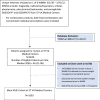Weight management medications for chronic use in 37 veterans affairs medical centers-A medication use evaluation
- PMID: 39219745
- PMCID: PMC11362804
- DOI: 10.1002/osp4.70002
Weight management medications for chronic use in 37 veterans affairs medical centers-A medication use evaluation
Abstract
Rationale: Controlled trials have demonstrated successful weight loss associated with certain weight management medications (WMMs). However, there are limited real-world data on prescribing patterns and efficacy and safety profiles of WMMs in Veterans Affairs (VA) patients.
Objective: To evaluate: utilization patterns of WMMs liraglutide, naltrexone/bupropion, orlistat, phentermine, phentermine/topiramate, and semaglutide; weight loss at three, six, twelve, and more than 12 months; safety; and treatment barriers.
Methods: A retrospective, cross-sectional medication use evaluation (MUE) was conducted using electronic health records of outpatient Veterans newly initiated on WMMs at 37 VA Medical Centers between 1 March 2020 and 31 March 2022. Chart review was used to identify WMM utilization and capture rates of clinical response, defined as 5% and 10% or greater weight loss at the final weight, adverse drug events (ADEs), non-adherence, and discontinuations. Site-specific surveys evaluated local practices and barriers.
Results: Among 1959 eligible Veterans, semaglutide, phentermine/topiramate, and orlistat were most frequently prescribed. The clinical response was highest among phentermine/topiramate, liraglutide, and semaglutide. Naltrexone/bupropion and phentermine demonstrated the highest and lowest ADE rates, respectively. Potential barriers to WMM utilization and successful treatment by site reports were drug shortages, patient perceptions of therapeutic course, personal preferences, and VA WMM use criteria.
Conclusions: Smaller weight loss and higher discontinuation rates were observed relative to clinical trials. The MUE data allow for better assessment of benefits and risks for Veterans prescribed WMMs.
Keywords: drug utilization; health systems; obesity; obesity treatment.
Published 2024. This article is a U.S. Government work and is in the public domain in the USA. Obesity Science & Practice published by World Obesity and The Obesity Society and John Wiley & Sons Ltd.
Conflict of interest statement
The authors declare no conflicts of interest.
Figures
References
-
- VA/DoD Clinical Practice Guideline. Management of adult overweight and obesity 2020. https://www.healthquality.va.gov/guidelines/CD/obesity/
LinkOut - more resources
Full Text Sources

